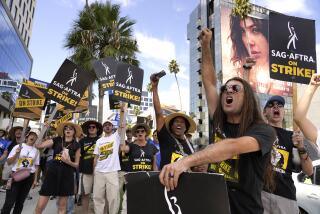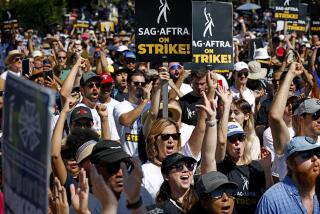Bush Outlines Plan to Assist the Jobless
- Share via
WASHINGTON — President Bush on Thursday proposed a 13-week extension of unemployment benefits and $3 billion more in emergency grants for some people thrown out of work by the Sept. 11 terrorist attacks.
But the expanded unemployment benefits would be available only in the hardest-hit states, and other proposals rely on existing programs and previously appropriated funds. Congressional Democrats said the package falls short of what is needed to help the growing ranks of unemployed.
“I think we’ve got to go farther,” said Senate Majority Leader Tom Daschle (D-S.D.).
Bush’s aid package for the unemployed is one of three main components of an economic stimulus plan he wants Congress to approve. The other two, which administration officials are still shaping, will feature tax cuts designed to give individuals more money to spend and to provide incentives for businesses to invest.
The president outlined his worker-assistance package amid new signs that the terrorist attacks are contributing to mounting job losses as the U.S. economy succumbs to what increasingly looks and feels like a recession.
The number of workers filing new applications for unemployment benefits rose to a nine-year high last week, the Labor Department reported Thursday. The number of initial claims jumped 71,000 to 528,000, the highest level since mid-1992.
The figures reflect a wave of layoffs by U.S. airlines and other industries directly affected by the terrorist strikes. Since Sept. 11, 200,807 job cuts have been announced, according to the outplacement consulting firm Challenger, Gray & Christmas. Layoff announcements totaled 248,332 for the entire month, a record.
Bush said the benefit extension and other assistance for displaced workers would “take care of” Americans directly affected by the attacks.
“We hear the cries of those who have been laid off,” Bush said in a speech to Labor Department employees. “We worry about the shock waves throughout our economy. And instead of talking, we’re going to do something about it.”
The president outlined a plan consisting of two main elements:
* A 13-week extension of unemployment benefits, currently limited to 26 weeks, for workers who lose their jobs after Sept. 11. The extension would be available only in states where the unemployment rate increased at least 30% or where the president declared a state of emergency.
* An additional $3 billion for “national emergency grants” to help cover the cost of health insurance for displaced workers and provide income to those who do not qualify for unemployment benefits, to be dispensed by the states.
Bush said existing federal programs provide job training, career counseling, placement services and other forms of support for people who lose their jobs. He said $11 billion in unused federal matching funds is available to states to help provide health insurance to low-income workers and their children.
“We don’t have time to try to invent new programs,” Bush said. “What we ought to do is make those programs that exist work better.”
The restrictions proposed by Bush would substantially limit the availability of extended unemployment benefits.
So far, states of emergency have been declared only in New York, New Jersey and Virginia following the terrorist attacks on the World Trade Center and the Pentagon.
Moreover, it is not clear whether any states will register a 30% increase in their unemployment rates any time soon. In California, for example, unemployment would have to rise from August’s 5.2% to nearly 6.8%, increasing the jobless rolls by 274,000.
Nevertheless, the president’s chief economic advisor, Lawrence B. Lindsey, said the program would have a powerful effect. “We want to have [extended] unemployment insurance benefits trigger on much, much earlier in the business cycle,” he said. “I would consider this a significant liberalization.”
House Minority Leader Richard A. Gephardt (D-Mo.) called the proposal a “step in the right direction.” But he said Bush’s approach would do nothing to help the millions of people who do not qualify for unemployment compensation because they are part-time or contract employees. “There is a huge group there falling through the cracks,” Gephardt said.
Bush’s proposal to provide $3 billion in emergency grants to help the unemployed keep their health coverage pales in comparison with the amounts some Democrats have contemplated. Senate Democrats are assembling an economic stimulus package that would allocate $16 billion in first-year funding to subsidize health benefits for unemployed workers.
The president’s emphasis on using existing programs to help workers was a relief to some Republicans, who were concerned that Bush seemed too eager to embrace proposals favored by Democrats.
House Majority Whip Tom DeLay (R-Texas) endorsed Bush’s package. “It is a lot better than the Democrats’ proposal,” a spokeswoman said. “The president is trying to do the best he can under trying circumstances.”
Other Republicans would just as soon drop the jobless benefit plan altogether.
“Unemployed Americans want to go back to work, not sit at home and collect a government paycheck,” said Rep. John B. Shadegg (R-Ariz.).
Shadegg heads the conservative Republican Study Group, which on Thursday unveiled its own economic stimulus package calling only for tax cuts, not additional government spending on things like unemployment benefits.
*
Times staff writer Peter G. Gosselin in Washington contributed to this report.
RELATED STORY
Growing toll: The number of post-attack layoffs continues to rise. C3
More to Read
Get the L.A. Times Politics newsletter
Deeply reported insights into legislation, politics and policy from Sacramento, Washington and beyond. In your inbox twice per week.
You may occasionally receive promotional content from the Los Angeles Times.









